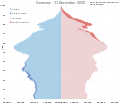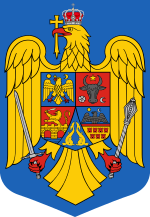approximately 866,690 Poles in Germany. The main Polonia organisations in Germany are the Union of Poles in Germany and Congress of Polonia in Germany. Polish surnames...
30 KB (2,746 words) - 16:06, 23 October 2024
Union of Poles in Germany (Polish: Związek Polaków w Niemczech, German: Bund der Polen in Deutschland e.V.) is an organisation of the Polish minority...
16 KB (1,496 words) - 09:39, 27 October 2024
the wider German nation. Until World War II the Poles were recognized as one of the national minorities. In 1924 the Union of Poles in Germany had initiated...
221 KB (9,265 words) - 00:52, 23 October 2024
Expulsion of Poles by Nazi Germany during World War II was a massive operation consisting of the forced resettlement of over 1.7 million Poles from the...
27 KB (2,724 words) - 15:32, 28 September 2024
Rodło (category National symbols of Poland)
since 1932 by the Union of Poles in Germany. It is a stylized representation of the Vistula River and Kraków as the wellsprings of Polish culture. After...
6 KB (515 words) - 14:55, 19 July 2024
Soviet Union. According to the 1926 Soviet census, there were a total of 782,334 Poles in the USSR. The largest concentration of Poles was in what was...
17 KB (2,058 words) - 12:41, 16 September 2024
Bolesław Domański (category Catholic clergy of the Prussian partition)
Catholic Priest, and was the President of the Union of Poles in Germany from 1931 to 1939. He served as the Parson of the Zakrzewo Parish from 1903 to 1939...
2 KB (136 words) - 18:29, 24 September 2024
The Union of Poles of Romania (Romanian: Uniunea Polonezilor din Romania, UPR; Polish: Związek Polaków w Rumunii "Dom Polski"), or Dom Polski, is an ethnic...
6 KB (358 words) - 05:20, 27 October 2024
between Germans and Poles also contributed much to the Germanisation of ethnic Poles in the Ruhr area. During the First World War, the German Empire planned...
31 KB (3,471 words) - 03:01, 21 October 2024
Polish diaspora (redirect from Poles in Macedonia)
the European Union and opening of the EU's labour market. About 2 million primarily young Poles took up jobs abroad. Most Poles live in Europe, the Americas...
81 KB (7,873 words) - 17:51, 27 October 2024
Anti-Polish sentiment (redirect from Organised persecution of ethnic Poles)
actions against Poles as an ethnic group, Poland as their country, and their culture. These include ethnic prejudice against Poles and persons of Polish descent...
110 KB (11,661 words) - 13:16, 27 October 2024
number of Poles in the Kresy in the year 1939 was around 5.274 million, but after ethnic cleansing in 1939-1945 by Nazi Germany, the Soviet Union and Ukrainian...
27 KB (2,978 words) - 15:59, 10 February 2024
The occupation of Poland by Nazi Germany and the Soviet Union during World War II (1939–1945) began with the Invasion of Poland in September 1939, and...
114 KB (12,224 words) - 04:56, 11 October 2024
Ruhrpolen (redirect from Ruhr Poles)
Ruhrpolen (German: [ˈʁuːɐ̯ˌpoːlən], “Ruhr Poles”) is a German umbrella term for the Polish migrants and their descendants who lived in the Ruhr area in western...
21 KB (2,155 words) - 19:46, 3 November 2024
Sorbs (redirect from Flag of Sorbs)
initiative of the Union of Poles in Germany in 1924. Sorbian journalist, poet and activist Jan Skala was a member of the press headquarters of the Union of Poles...
89 KB (10,138 words) - 21:38, 24 October 2024
German police and army arrested 7,000 Poles in Gdynia. German troops carried out massacres in Sulejówek and Długa Szlachecka, killing over 90 Poles....
49 KB (5,170 words) - 07:02, 21 April 2024
and in several cases Germans defiled icons or religious items symbolic for Polish people. Poles were forbidden to attend funerals of other Poles unless...
97 KB (10,306 words) - 18:14, 21 October 2024
Congress of Polonia in Germany Union of Poles in Germany European Roma Rights Centre Association of Poles in Lithuania Kaunas Cultural Centre of Various...
5 KB (478 words) - 15:48, 14 September 2023
Bytom (redirect from History of Bytom)
the day of the outbreak of the war, Adam Bożek, the chairman of the Upper Silesian district of the Union of Poles in Germany, was arrested in Bytom and...
25 KB (2,522 words) - 12:14, 22 October 2024
massacred Polish prisoners of war, and in less than two years, deported up to 1.5 million ethnic Poles to Siberia including Poles and Polish Jews from West...
23 KB (2,318 words) - 05:45, 27 October 2024
Złotów (category CS1 German-language sources (de))
the town became the seat of local branches of the Union of Poles in Germany and the Polish-Catholic School Society. Local Poles managed to establish a Polish...
14 KB (1,241 words) - 19:37, 3 November 2024
Gliwice (redirect from History of Gliwice)
and enterprises still operated in the city in the interbellum, including a local branch of the Union of Poles in Germany, Polish banks and a scout troop...
54 KB (5,231 words) - 15:10, 29 October 2024
border of Germany, i.e. the Oder–Neisse line, which historically had been considered German and which were annexed by Poland and the Soviet Union after...
81 KB (9,362 words) - 12:08, 21 October 2024
The massacres of Poles in Volhynia and Eastern Galicia (Polish: rzeź wołyńsko-galicyjska, lit. 'Volhynian-Galician slaughter'; Ukrainian: Волинсько-Галицька...
129 KB (16,079 words) - 23:15, 25 October 2024
into German identity of a small minority of Poles deemed "racially valuable". During World War II, the Germans not only murdered millions of Poles, but...
99 KB (10,117 words) - 02:00, 25 October 2024
pressure group created in 1924 at the initiative of the Union of Poles in Germany which aimed at representing the interests of the Polish, Danish, Sorbian...
3 KB (307 words) - 19:00, 20 May 2020
number of soldiers killed in battle. Most of the deaths from starvation in Europe were in the Soviet Union and Poland, countries invaded by Germany and occupied...
21 KB (2,705 words) - 12:16, 15 October 2024
The German minority population in Russia, Ukraine, and the Soviet Union stemmed from several sources and arrived in several waves. Since the second half...
57 KB (7,166 words) - 18:29, 6 October 2024
Sobibór. Ethnic Poles were subjected to both Nazi German and Soviet persecution. The Germans killed an estimated two million ethnic Poles. Generalplan Ost...
216 KB (24,896 words) - 02:02, 27 October 2024
Zabrze (redirect from History of Zabrze)
operated in the city in the interbellum, including a local branch of the Union of Poles in Germany, Polish libraries, sports clubs, credit unions, choirs...
27 KB (2,529 words) - 21:40, 28 October 2024




















